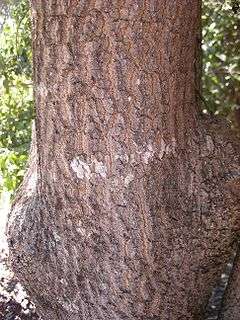Alstonia constricta
| Alstonia constricta | |
|---|---|
 | |
| Alstonia constricta foliage and flowers | |
| Scientific classification | |
| Kingdom: | Plantae |
| (unranked): | Angiosperms |
| (unranked): | Eudicots |
| (unranked): | Asterids |
| Order: | Gentianales |
| Family: | Apocynaceae |
| Tribe: | Plumeriae |
| Subtribe: | Alstoniinae |
| Genus: | Alstonia |
| Species: | A. constricta |
| Binomial name | |
| Alstonia constricta | |
Alstonia constricta, commonly known as Quinine Bush or Bitterbark, is an endemic Australian endemic shrub or small tree of the family Apocynaceae.
Growth
Alstonia constricta has an erect growth form. Growing to 12 m in height. The species is capable of producing adventitious shoots or ‘suckers’ from the root system and in this manner often forms thickets. Leaves are pubescent, narrow and lanceolate, from 5–20 cm in length. Flowers are white to cream, 2– 4 cm across. The bark has a corky textured and develops a grooved appearance in older plants. Alstonia constricta produces a white latex, and contains several alkaloids, several of which have medicinal potential, including reserpine.
Distribution and habitat

A constricta is the only subtropical member of the genus, and occurs in Eastern Australia from the Tropic of Capricorn southward to northern New South Wales. The species occurs in Eucalypt and Acacia woodlands, vine scrubs and gallery forests from humid coastal regions through to the semi-arid and arid inland. The field botanist Anders Bofeldt discovered an isolated population in the Shoalhaven River Gorge in southern New South Wales.[1]
References
- ↑ Floyd, A.G., Rainforest Trees of Mainland South-eastern Australia, Inkata Press 2008, ISBN 978-0-9589436-7-3 page 71
External links
| Wikispecies has information related to: Alstonia constricta |